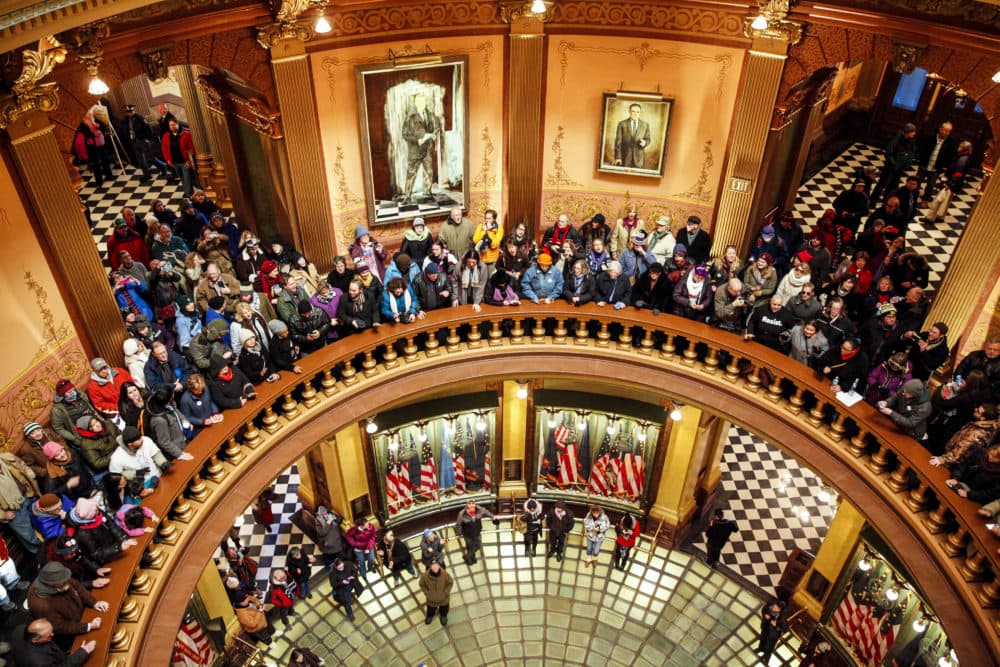Advertisement
Democrats Call For Abolishment Of Electoral College. But That Could Get Complicated.

Six Democratic 2020 presidential candidates have recently expressed support for abolishing the Electoral College. U.S. Sen. Elizabeth Warren said in a recent Mississippi town hall that “everybody ought to have to come and ask for your vote,” and South Bend, Indiana Mayor Pete Buttigieg pushed for the college’s elimination on the first day of his presidential exploratory campaign.
The electoral college is unique — no other democratic country elects their head of state quite like the U.S. does. Every four years when citizens vote in the presidential election, they are actually casting ballots for electors. And in recent years, the system's been contentious. President Trump lost the popular vote to Hillary Clinton in 2016 by a 2 percent margin, but won the election by 77 electoral votes. In 2000, President George W. Bush also lost the popular vote, to Al Gore by a 0.51 percent margin, but won the election by five electoral votes.
Ditching the system, though, which has allowed four presidents to take office despite losing the popular vote, could be more complicated than it may seem. The change would have to come through either a constitutional amendment or a national compact, according to NPR congressional correspondent Scott Detrow.
Under a national compact, states sign laws pledging to give their electoral votes to the winner of the national popular vote. “This will kick in as soon as they have 270 electoral votes in their compact,” Detrow (@scottdetrow) explains to Here & Now’s Jeremy Hobson.
The idea has gained more traction recently, with Colorado and Delaware signing laws joining the compact, and it’s now up to 184 electoral votes, says Detrow.
“I think that would happen quicker than a constitutional amendment, given how fractured our current government is to get most basic things done,” he says, “let alone amending the Constitution with the amount of support that that would mean.”
Interview Highlights
On the history of the electoral college
“The thing that we often forget is that the idea of direct democracy and popular voting really wasn't baked into the United States at the early-on: We were a republic, but the idea that people would go to the polls — let alone the entire country would go to the polls — to select a president just really wasn't on most of the founders' minds. ... The idea of the popular vote playing a big role in determining the president really wasn't something that kicked in until over the course of the 19th century in waves that really became the norm going forward.”
"Certainly the way that people run for president would change if this kicked in. But I think right now, this is something that people are talking about. I think there's several more steps that need to happen for this to become close to reality."
Scott Detrow
On presidents who lost the popular vote, but won the electoral vote, and whether the Electoral College is working the way it’s intended
“The fact that it's happened two times in recent memory — and both times, the Democrats have been on the losing side of that split — has certainly made Democrats a lot more fired up about this issue than Republicans. Though, if you look at the polls, the idea of getting rid of the Electoral College is broadly popular.
“I think by and large, people view themselves as Americans and all living under the same government, so I think the idea of reassessing this is something that's picked up some steam.”
On the argument that abolishing the Electoral College would give population centers, like Chicago and New York, all the political power in elections
“I'm not sure how much that holds up, because if you go state by state, each state has its own population centers as well, right. We're spread out in disproportionate numbers, and sometimes we're in clumps, and sometimes we're not, and no matter where you're running, you're going to go focus where the bulk of the votes are.
Advertisement
“Certainly the way that people run for president would change if this kicked in. But I think right now, this is something that people are talking about. I think there's several more steps that need to happen for this to become close to reality.”
On what eliminating the Electoral College would mean for future elections
“Reporters like me would spend a lot less time in Iowa and North Carolina and some of the key states. I mean, let's look at 2020, right. I think four or five states are going to determine it — Arizona maybe, North Carolina maybe, certainly Pennsylvania, Michigan and Wisconsin. A Democrat especially is going to be in those states all the time. I think this would have an effect on local TV ads. I think this would have an effect on travel. But in terms of the message of the campaign, I don't think that would change too much. Because now that every event is live-streamed online as well as [on] TV, it's not like candidates are tailoring their message in different ways as they campaign in different places in the general election.”
Savannah Maher produced and edited this interview for broadcast with Todd Mundt. Jackson Cote adapted it for the web.
This segment aired on March 29, 2019.
